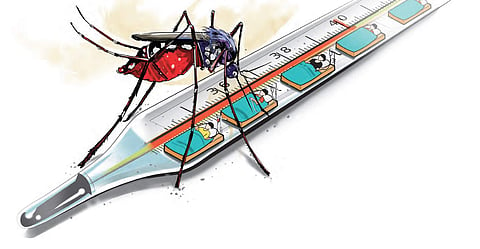

JOHNS HOPKINS STUDY MAY PUT A HALT TO MOSQUITO BITES
Johns Hopkins Medicine researchers have mapped specialised receptors on the nerve cells of a mosquito’s antenna which enable them to detect human odour to decide whom to bite more than others for a blood meal. Mosquitoes use their antennae to detect human odour. It has been known that the variations in human body heat, humidity and odour plays an active role in mosquitoes to get attracted to some humans, but not others. But the receptors that aid in the hunt had never been mapped.
The mapping of these receptors opens the way to understand the mechanism of how mosquitoes “choose” whom to bite for a blood meal, and find a way to eliminate those so mosquitoes can no longer bite humans. The mapping yielded three types of receptors located on nerve cells in the mosquito’s antenna — odorant receptors, which help mosquitoes to distinguish between humans and animals; Gustatory receptors, which detect carbon dioxide; and Ionotropic receptors, which respond to acids and amines found in the human skin. The researchers say understanding the molecular biology of mosquito odour-sensing is key to developing new ways to avoid bites and diseases that they cause.
‘SHEEP CAN BE STRESS-BUSTERS’
A study by University of California has found that grazing sheep can not only help in urban lawn landscaping, but also relieve stressed and anxiety-ridden individuals of their maladies just watching them graze. The study was taken up during the peak of the pandemic, and was initially aimed at determining whether sheep could benefit urban lawn landscapes and make a case for increasing their usage in urban settings. While their study aimed at looking at advantages of bringing grazing sheep into urban settings to explore its benefits on improving urban landscaping, the fall-out observation was that it had a ‘peaceful’ effect on the volunteers.
5 NEW ANTIBIOTIC-RESISTANT, BACTERIA-KILLING VIRUSES FOUND
W hile antibiotic-resistant bacteria are emerging as a major worry in the medical and health care field, researchers from University of Southern Denmark have discovered five new species of bacteria-killing viruses, known as bacteriophages. Of the five, so far only one has been genome sequenced, and named ‘Fyn8’. Unlike antibiotics which kill a whole range of bacteria, bacteriophages can kill just one target bacterium species by the millions.
Fyn8 has been found to be targeting a bacterium called Pseudomonas aeruginosa, found naturally in soil and water, but is normally harmless on healthy people. But what has excited the researchers is that Fyn8 was able to attack and kill Pseudomonas aeruginosa despite the latter having developed antibiotic resistance. Their excitement goes further in anticipation of knowing which bacteria the other four yet-to-be-sequenced newly-discovered virus species can attack and kill.